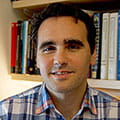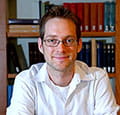McCormick / NICO / Kellogg 2018: 4th Annual International Conference on Computational Social Science
Hosted by the Kellogg School of Management, Northwestern University, Evanston, IL USA
Speakers
 Lada Adamic
Lada Adamic
Facebook
Research Scientist Manager
 Damon Centola
Damon Centola
University of Pennsylvania
Associate Professor, Annenberg School for Communication
 Moran Cerf
Moran Cerf
Kellogg School of Management, Northwestern University
Associate Professor of Marketing
 Nitesh Chawla
Nitesh Chawla
University of Notre Dame
Frank M. Freimann Professor of Computer Science & Engineering and
Director of the Research Center on Network and Data Sciences (iCeNSA)
 Tanzeem Choudhury
Tanzeem Choudhury
Cornell University
Associate Professor, Information Science
 Aaron Clauset
Aaron Clauset
University of Colorado Boulder
Assistant Professor of Computer Science
Clauset is internationally recognized for his work on network science, complex systems, and computational social science. His work has appeared in Nature, Science, PNAS, JACM, WWW, ICWSM, STOC, SIAM Review, and Physical Review Letters, and has been covered in the popular press by the Wall Street Journal, The Economist, Discover Magazine, New Scientist, Wired, Miller-McCune, the Boston Globe and The Guardian.
 Iain Couzin
Iain Couzin
University of Konstanz, Germany
Director of the Max Planck Institute for Ornithology and the Chair of
Biodiversity and Collective Behaviour
 David Ferrucci
David Ferrucci
Elemental Cognition
Founder and CEO
Dave’s scholarship, leadership and success opened up a new field of research which moved beyond statistical correlations to integrating logic tools for improved understanding of human behavior. Not only does he continue to advance this research at Bridgewater today, but with IBM opening up Watson to developers via the cloud, a limitless number of computer scientists, sociologists and innovators will be able to trace their successes back to David, his team and his belief in forging a new trail. He has been named Innovator of the Year by R&D Magazine and Identified by Slate as among "The Most Innovative and Practical Thinkers of Our Time."
Dave holds a PhD in Computer Science from Rensselaer Polytechnic Institute and a BS in Biology from Manhattan College. With this: Dave is the founder and CEO of Elemental Cognition. With Elemental Cognition, Dave sees a future in which AI “will become a powerful amplifier of human creative potential – a system based not on machine learning but natural learning that will enable humans and machines to explore, collaborate and ask 'why' together."
 Marta C. Gonzalez
Marta C. Gonzalez
University of California Berkeley
Associate Professor of City and Regional Planning
Lawrence Berkeley National Laboratory
Physics Research Faculty
 Matt Jackson
Matt Jackson
Stanford University
William D. Eberle Professor of Economics
 David Lazer
David Lazer
Northeastern University
Distinguished Professor of Political Science and Computer and Information Sciences
 Marta Sales-Pardo
Marta Sales-Pardo
University Rovira i Virgili
Associate Professor
 Duncan Watts
Duncan Watts
Microsoft
Principal Researcher
Duncan Watts is a principal researcher at Microsoft Research and a founding member of the MSR-NYC lab. He is also an AD White Professor at Large at Cornell University. Prior to joining MSR in 2012, he was from 2000-2007 a professor of Sociology at Columbia University, and then a principal research scientist at Yahoo! Research, where he directed the Human Social Dynamics group.
His research on social networks and collective dynamics has appeared in a wide range of journals, from Nature, Science, and Physical Review Letters to the American Journal of Sociology and Harvard Business Review, and has been recognized by the 2009 German Physical Society Young Scientist Award for Socio and Econophysics, the 2013 Lagrange-CRT Foundation Prize for Complexity Science, and the 2014 Everett Rogers M. Rogers Award.
He is also the author of three books: Six Degrees: The Science of a Connected Age (W.W. Norton, 2003) and Small Worlds: The Dynamics of Networks between Order and Randomness (Princeton University Press, 1999), and most recently Everything is Obvious: Once You Know The Answer (Crown Business, 2011).
Watts holds a B.Sc. in Physics from the Australian Defence Force Academy, from which he also received his officer’s commission in the Royal Australian Navy, and a Ph.D. in Theoretical and Applied Mechanics from Cornell University.